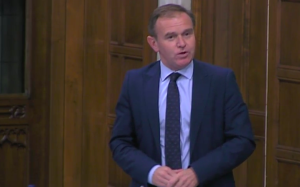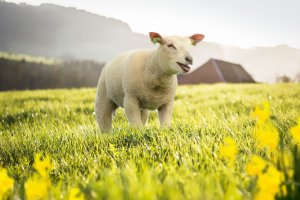Millions of animals are suffering unnecessarily by being slaughtered without stunning to meet religious demands.
That's why we campaign to end religious exemptions to animal welfare laws.
Animal welfare law requires animals to be stunned before slaughter to minimise their pain, suffering and distress. The only exemption is for Jewish and Muslim communities to meet kosher and halal religious dietary preferences.
The scientific consensus is clear that it is more humane to stun an animal prior to slaughter. The slaughter of animals without pre-stunning is permitted in the UK despite a recommendation by the government's own advisory body, the Farm Animal Welfare Council (FAWC), that the practice should be banned. FAWC concluded that animals slaughtered without pre-stunning are likely to experience "very significant pain and distress".
RSPCA, Compassion in World Farming and the British Veterinary Association all support an end to non-stun slaughter to improve animal welfare at the time of death.
- 70% of Brits think stunning animals before slaughtering them is more ethical.
- 72% of the population think food produced from religious non-stun slaughter methods should be clearly labelled.
We support the right to religious freedom. But this is not an absolute right. Religious exemptions shouldn't be made to laws meant to prevent unnecessary animal cruelty.
Take action!
1. Write to your MP
Ask your MP to end the religious exemption that allows animals to be slaughtered without pre-stunning.
2. Share your story
Tell us why you support this campaign, and how you are personally affected by the issue. You can also let us know if you would like assistance with a particular issue.
3. Join the National Secular Society
Become a member of the National Secular Society today! Together, we can separate religion and state for greater freedom and fairness.
Latest updates
Former farming minister calls for free vote on religious slaughter
Posted: Tue, 2 Jul 2019 13:04
The former farming minister George Eustice MP has called on all political parties to make restrictions on religious non-stun slaughter a free vote issue.
Eustice, the Conservative MP for Camborne and Redruth, said civil servants felt "awkward" when tackling religious slaughter, meaning governments of all shades leave it in the "too difficult to address box".
He said a free vote would "liberate" ministers and the government for wrestling with the issue and allow parliament to decide.
He was speaking as he led a debate on the issue in Westminster Hall on Tuesday.
A free vote or 'conscience vote' allows members of parliament to vote according to their own personal conscience rather than following a party policy.
National Secular Society chief executive Stephen Evans welcomed the intervention, saying it was "encouraging" to see parliamentarians wanting to make headway on this important issue.
"Non-stun slaughter is a barbaric practice that causes unnecessary suffering to millions of animals every year. Putting a stop to it would enjoy huge public support – but because ministers feel uneasy about upsetting religious sensitivities, nothing happens.
"We need to be clear that religious freedom is not absolute. Laws concerning the welfare of animals should apply equally to all sections of society, irrespective of their beliefs."
Animal welfare legislation in the UK requires all animals to be stunned before slaughter in order to minimise suffering. However, a religious exemption is granted to allow religious communities to meet Jewish and Muslim religious dietary preferences.
The RSPCA, Compassion in World Farming and the British Veterinary Association all support an end to non-stun slaughter to improve animal welfare at the time of death.
During the debate, Eustice said there had been an "alarming rise" in non-stun slaughter.
He said the time it takes bovine animals to lose consciousness following non-stun slaughter was a "major cause for concern". In the case of cattle, he said it typically takes between 40-45 seconds to collapse and between 1 minute 20 seconds and two minutes for the animal to lose consciousness.
He disputed claims from the non-stun lobby group ShechitaUK that the Jewish method of animal is more humane, saying there was "no evidence" to support that view.
Eustice drew attention to the "mainstreaming of religious slaughter", saying "unwitting customers" are buying meat from non-stun slaughter due to offcuts from religious slaughter methods being slipped into the general market, usually through the service trade.
To address this specific issue, he suggested the introduction of non-stun quotas for abattoirs to ensure that no more meat from non-stun slaughter is produced than necessary. This would require abattoirs to demonstrate a demand for the meat from non-stun slaughter they produce.
A similar system operates in Germany where the law makes this clear by stating that a no-stunning permit will only be granted to meet the needs of religious communities.
During the debate Eustice also questioned whether the derogation that permits non-stun slaughter was to accommodate a "religious need" or a "cultural interpretation of a religious need", noting that there are wide variations what is considered 'permissible' by religious groups.
Eustice said options to consider going forward included a ban on non-stun slaughter; the requirement that animals are stunned immediately after they are cut; and the introduction of mandatory labelling of non-stun meat.
In response food minister David Rutley said the government would "prefer" to see all animals stunned before slaughter but "respects the rights of Jews and Muslims to eat meat slaughtered in accordance with their beliefs".
He said the right to slaughter without prior stunning was an "important religious freedom" but said there was a need to balance religious freedoms with improving the welfare of animals. He said it was a "difficult juggle", but "not impossible".
The minister committed to continuing discussion and debate.
The NSS, which campaigns to end the religious exemption to animal welfare laws which allows non-stun slaughter and for clear labelling requirements while the exemption exists, briefed MPs before the debate.
In a blog explaining his stance on PoliticsHome, Eustice wrote that the requirement for meat from non-stun slaughter to be supplied only on the basis of religious need was "not enforceable in practice".
He added that Britain was "being left behind by other developed nations when it comes to our legislation on religious slaughter".
MPs call for labelling of meat from non-stun slaughter
Posted: Wed, 3 Apr 2019 17:35
A group of cross-party MPs is calling for meat produced from religious non-stun slaughter methods to be clearly labelled to allow consumers to make an informed choice.
At least 21 MPs have put their names to a proposed amendment to the Agriculture Bill – to introduce labelling to indicate the slaughtering method.
The amendment (new clause 31) was tabled by Conservative MP Giles Watling.
It would require all meat products to be labelled as to the method of slaughter. The labelling would include a statement on whether the animal was stunned during the process.
Animal welfare legislation requires all animals to be stunned before slaughter in order to minimise suffering. The only exemption is for religious communities to meet Jewish and Muslim religious dietary preferences.
At present, there is no requirement for meat from non-stun slaughter to be labelled. Meat from animals killed under the religious exemption is supposed to be produced for "the food of Muslims" or "the food of Jews".
In practice there is minimal targeting of supply and meat from non-stun slaughter is routinely sold or served to consumers who do not want their meat to be prepared in this way.
The National Secular Society has been lobbying parliamentarians for the repeal of the religious exemption to the animal welfare law, and for a labelling requirement while the exemption is in place. The NSS is supporting the proposed amendment to the Agriculture Bill.
Stephen Evans, the NSS's chief executive, said: "Welfare standards introduced to minimise animal suffering should apply equally to all and without exemption. Religious exemptions that allow animals to be slaughtered without pre-stunning should therefore be repealed.
"In the meantime, it is important that mandatory method of slaughter labelling is introduced so that consumers are not unwittingly consuming non-stun meat and always have the option of buying meat from animals slaughtered in a humane way."
Food minister David Rutley MP told the NSS: "The government is aware that there is public concern about meat from animals slaughtered in accordance with religious beliefs being sold to consumers."
He said the government "respects the rights of Jewish and Muslim communities to eat meat prepared in accordance with their religious beliefs". But he added that "consumers should have the necessary information available to them to make an informed choice about their food".
Parliamentary support for mandatory labelling is strong. Over 90 MPs have put their name to a motion calling for the introduction of specific labelling to identify meat that has been pre-stunned before slaughter.
The Food Standards Agency (FSA) 2018 slaughterhouse survey recently revealed that in 2018 over 94 million cattle, sheep and poultry were slaughtered without being stunned first in England and Wales.
The move to introduce labelling comes as MPs debated non-stun slaughter during a Westminster Hall debate on Wednesday. During the debate Conservative MP Laurence Robertson said he was "not concerned about expressions of religious belief" but thought "beliefs sometimes have to be tempered by the fact that we should not cause another living thing harm when that can be mitigated."
He said that having considered the evidence, he thought there was a "strong case to be made for the banning of non-stun slaughter".
The Agriculture Bill completed its committee stage in November 2018, but no date has yet been set for the Bill to have its report stage and third reading.




